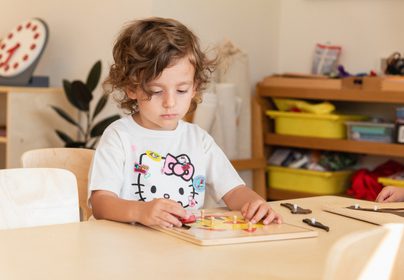The Montessori method is known for its unique, child-centered approach that nurtures independence, creativity, and curiosity.
One of the core pillars of this method is Practical Life Activities, which are often overlooked but play a crucial role in the holistic development of children. These exercises are designed to equip children with essential life skills while fostering responsibility, concentration, and self-confidence. In this article, we explore the significance of Practical Life activities and how they contribute to children’s overall growth.
What Are Practical Life Activities?
Practical Life activities in Montessori refer to real-world tasks that children perform as part of their learning process. These include everyday actions such as pouring water, buttoning clothes, sweeping, cooking, washing dishes, and organizing their environment. While they may seem simple, these tasks are purposefully structured to enhance both fine and gross motor skills, develop independence, and encourage children to take responsibility for their surroundings.
Why Are Practical Life Activities Essential?
Montessori emphasizes the idea of “Help me do it by myself.” Practical Life activities empower children to manage tasks independently, instilling a sense of accomplishment. Each small success—whether tying shoelaces or setting the table—builds their self-esteem and helps them feel capable and competent.
Activities such as pouring, spooning, and polishing engage the muscles of the hands and fingers, refining children's fine motor skills. Gross motor skills are enhanced through physical tasks like sweeping or gardening. These improvements lay the groundwork for writing and other tasks requiring precision.
Montessori Practical Life exercises require children to perform step-by-step activities, encouraging sustained focus. Completing these tasks independently helps children develop the ability to concentrate over extended periods, which is essential for academic success and personal growth.
By engaging in activities such as cleaning up spills, watering plants, or feeding pets, children learn to care for both their environment and themselves. They come to understand that their actions have consequences and develop a sense of responsibility toward their surroundings.
Montessori classrooms provide a structured environment where children learn to organize their belongings, follow routines, and perform activities in a logical sequence. Through these exercises, children develop a sense of order and discipline, which translates into better time management and organization skills as they grow.
Collaborative activities, such as group cooking or setting the table together, teach children teamwork and communication skills. In the process, they learn patience, respect, and how to handle frustration—valuable lessons for emotional intelligence.
Practical Life activities go beyond teaching children how to perform daily tasks—they also promote a mindset of lifelong learning and adaptability. These exercises help children develop critical thinking, problem-solving abilities, and resilience.
By focusing on practical tasks, Montessori education prepares children not only for academic success but also for life beyond the classroom, equipping them with the tools to thrive in a complex world.




